|
De Amerikaanse schrijver Neal Cassady werd geboren op 8 februari 1926 in Salt Lake City. Zie ook alle tags voor Neal Cassady op dit blog.
Uit: The First Third
“One day as I looked the train over for brakes sticking etc. I happened to climb up on the top to check the indicators of a passing train (our pride, the Daylight, number 99) and on top of the reefer was a bum. I see at least 10 or 20 bums each day, however I was really stoned, the sun was so warm, and I had almost an hour to wait before my train pulled, so I sat beside this guy and we talked. Suddenly he began telling of his hallucinations; these were a collection of semi-ordinary bum ideas like the one about when he arrived in SF he walked along Mission and when he saw the patrol car he thought he heard the policeman announcing over the car’s loudspeaker, as his fellow policeman drove slowly by, these words over and over: “The time has come, everybody lie down so you won’t get hurt when the sun bursts.” His mind heard these words, but his emotions felt they were actually driving toward him to arrest him because his fly was open (zipper broke and no pins to hold it closed) so he ran to hide in an alley but they drove by there too; so he left SF and caught a freight to Watsonville. This is the simplest and most believable of his images. It all began after he had had sour wine and actually not eaten for four days. He was in the Sacramento Freight yards and he boards a flatcar to lie down. The world seemed normal and there was no indication anything unusual was to happen. It began slowly and normally also—the common thing of one’s mind taking up the sound of a big steam engine as it passes slowly and arranging its bark into a rhythm and then putting a short phrase to the rhythm. The particular accentuation of a steam engine is well known [like—He’s a nigger, he’s a nigger on and on with the accent on the first word, of course if one stays with it long enough you can place your accents anywhere because the exhaust of the engine changes with the amount of pull—like shifting gears) that most people if they do fall into creating a phrase to match the engine’s sound, so get bored with the project and stop soon.“
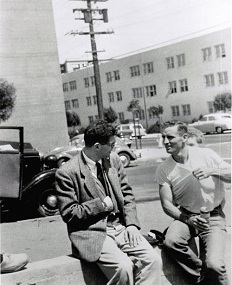
Neal Cassady (8 februari 1926 – 4 februari 1968)
Hier met Allen Ginsberg (links), 1955
De Nederlandse dichter, songwriter en musicus Robin Block werd geboren op 8 februari 1980 in Heemskerk. Zie ook alle tags voor Robin Block op dit blog.
Dolle honden jonge goden
We gierden langs de grachtenpanden
lalden onze psalmen in de neontempels
dansend
engelenpoeder snoven wij
en het stof van modderzolen
kraakten onderhuids betonnen codes
en sponnen ons geheim
tussen de koekoek en de windhaan
tussen de sterren en een smeulende kerk.
er klonk een wiegelied over de blauwe daken
er riep een weeskind om zijn vader
er scheen een maan om naar te huilen
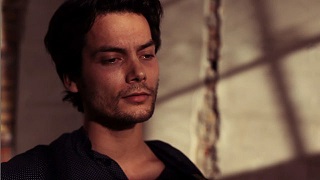
Robin Block (Heemskerk, 8 februari 1980)
De Amerikaanse dichteres en schrijfster Elizabeth Bishop werd geboren op 8 februari 1911 in Worcester, Massachusetts. Zie ook alle tags voor Elizabeth Bishop op dit blog.
Conversation
The tumult in the heart
keeps asking questions.
And then it stops and undertakes to answer
in the same tone of voice.
No one could tell the difference.
Uninnocent, these conversations start,
and then engage the senses,
only half-meaning to.
And then there is no choice,
and then there is no sense;
until a name
and all its connotation are the same.
Rain Towards Morning
The great light cage has broken up in the air,
freeing, I think, about a million birds
whose wild ascending shadows will not be back,
and all the wires come falling down.
No cage, no frightening birds; the rain
is brightening now. The face is pale
that tried the puzzle of their prison
and solved it with an unexpected kiss,
whose freckled unsuspected hands alit.
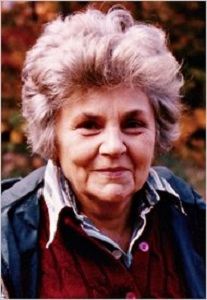
Elizabeth Bishop (8 februari 1911 – 6 oktober 1979)
De Duitse dichteres en schrijfster Eva Strittmatter werd als Eva Braun geboren op 8 februari 1930 in Neuruppin. Zie ook alle tags voor Eva Strittmatter op dit blog.
Kunsterspring
Wie waren die Wälder finster.
Und im Winter: wie waren sie weiß.
An den Wegrändern blühte der Ginster.
Und die Sommer: Die Sommer warn heiß.
Die Tage warn blau von Lupinen.
Und morgens war die Welt neu.
Wir aßen die Sonne. Und tranken den Regen.
Und schwammen im Juni im Heu.
Und damals gab es Libellen.
Und man sah sie zum erstenmal.
Und der Großvater erzählte von Quellen
Hinterm Walde. In einem Tal.
Die hatten auch einen Namen.
Der hieß Kunsterspring. Kunsterspring ...
Und wie viele Jahre verkamen.
Und wieviel Leben verging.
Und der alte Mann ist hinunter.
Und ich weiß den Weg nicht mehr.
Doch ich suche den Spring noch immer.
Und mir ist, als ob ich ihn hör.
Lupine
Lupinenblau - so war doch was
In meiner Kindheit. War es Glas?
Was war so blaß wie die Lupinen,
Die sich wie wild dem Licht zudrehn,
Wie blaue Flammen, die nicht brennen
Und doch so überschnell vergehn?
Glas war es, Steine, Glitzerkram,
Weiß nicht mehr, wie er an mich kam,
Weiß nur noch dieses bleiche Blau,
Die Sehnsuchtsfarbe. Morgentau
Im leichten Himmelslicht erstarrt,
Und ein Gefühl von solcher Art:
Glückstropfen, in der Faust zerpreßt,
Verloren. Doch es blieb ein Rest
Der Sehnsuchtsfarbe Lerchenblau.
Lupinen brennen unterm Tau.
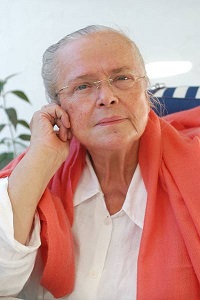
Eva Strittmatter (8 februari 1930 – 3 januari 2011)
De Oostenrijkse dichter en schrijver Gert Jonke werd geboren op 8 februari 1946 in Klagenfurt. Zie ook alle tags voor Gert Jonke op dit blog.
LIED DES FLIEGENDEN POETEN
Vogel schau
Wilde Wolkensau
Wird verjagt
Nebelgrau
Dort aus dem Wolkenbau
Unser dummer guter Mittagssonnenpfau
Spannt täglich sein Lichtstrahlenrad
Übern Marktplatz unserer neuen Stadt
Schaut Vögel schaut
HIMMELBLAU
Wird gebaut
WANDERT DER HIMMEL
durch deine Augen
beginnt es zu regnen
treten erwachende Wolken
in deine Pupillen
über die Ufer
an denen der Grünspan
keimender Weingärten
beginnt wie ein
hummelschwanzschimmerndes
Bodenrestmuster im ausgetrunkenen Glas
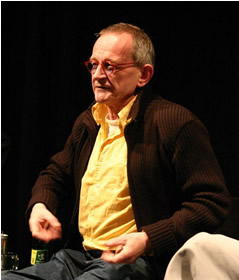
Gert Jonke (8 februari 1946 – 4 januari 2009)
Zie voor nog meer schrijvers van de 8e februari ook mijn vorige blog van vandaag.
|



